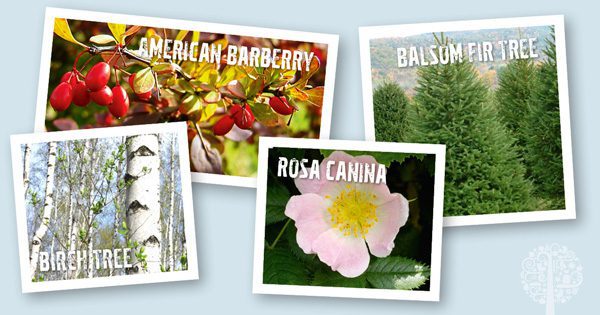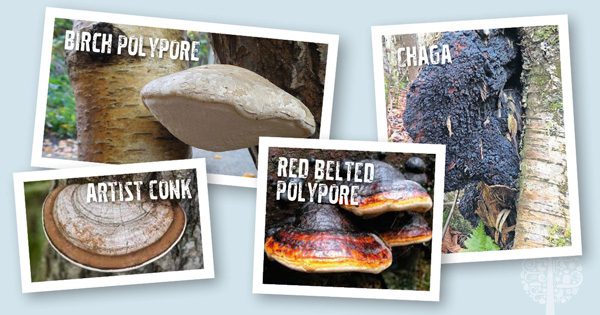With snow still on the ground and the cold weather not yet over, you might think there’s nothing left to forage out in the wild. But if you know where to look, nature still provides many great medicinal plants, even in the winter!
Medicinal Fruits
Your garden can be the first place to search for winter medicine, especially if you have wild rose plants growing (Rosa canina, Rosa gallica, or Rosa rugosa). If birds and other critters haven’t eaten them yet, you might find some medicinal rose hips on the bushes. Rose hips are an excellent source of vitamin C, flavonoids, and are high in antioxidants, which support the immune system and help manage stress. Reap the benefits by drinking 8 -12 ounces of rosehip tea.

American Barberry
American Barberry (Berberis canadensis) and Japanese Barberry (Berberis thunbergii) have fruits on their steams throughout the winter. The cold and frost will give the red berries a sweeter taste, and they are typically used in jelly preserves, eaten raw, or brewed as a tea. An excellent vitamin C source, the small berries also contain a unique compound called berberine, which may improve blood sugar control, treat diarrhea, and fight inflammation related to dental infections and acne. Berberine is more concentrated in the bark and the roots of the shrub.
Medicinal Twigs
Balsom fir trees (Albies balsamea), also known as the Christmas tree, are also excellent medicinal allies we can rely on during the winter season! This generous tree has been sharing its therapeutic gifts for centuries, with Native Americans using the bark, twigs, and resin to treat sore throats, fight colds, and accelerate wound healing. The aromatic needles can be infused in water to make delicious tea chock-full of vitamin C. The tree needles make soothing massage oil for achy muscles.
Medicinal Sap
Closer to spring, when temperatures warm up and the sap begins to flow, head to the nearest birch tree for a medicinal boost. Also called birch water, the fluid from white, silver, yellow, sweet, and American birch trees nourishes the body with calcium, potassium, and antioxidants. Birch sap also contains potent diuretics that help the body eliminate toxins, uric acid, and excess water. There is little research on birch sap’s medicinal properties; however, it has long been used as a drink in traditional medicine. It was an antidote for scurvy, and birch water is appreciated for its fortifying, revitalizing, and tonic action. The subtle, sweet-tasting sap has much to share!
Medicinal Mushrooms
With a good pair of snowshoes, winter is also a good time to search for medicinal mushrooms. Despite the snow, many mushrooms are still visible. Tree shelf mushrooms, also known as a polypore, are the easiest to find. They grow in large numbers on tree trunks. Birch polypore (Fomitopsis betulina), the artist conk (Ganoderma applanatum), Chaga (Inonotus obliquus) and Red Belted polypore (Fomitopsis pinicola) are easily accessible, identifiable, and all offer many medicinal properties.
